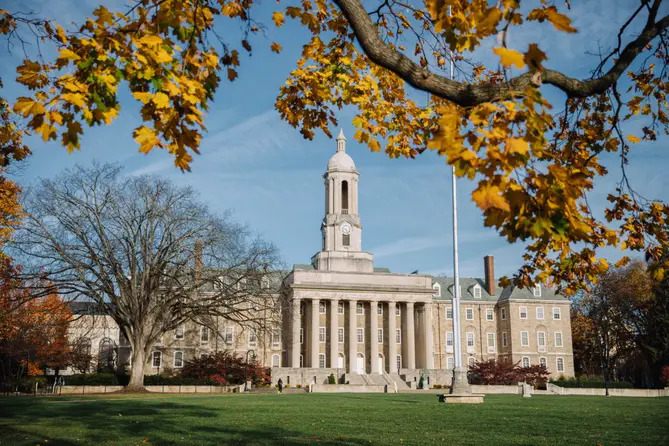States
Penn State’s University Leadership Faces Scrutiny From Numerous Faculty Members

Penn State’s University Leadership Faces Scrutiny:
Race at American universities has been a major problem, and Penn State University is no exception. Faculty and administration have fiercely debated the university’s racial justice policies. Many doubt the university’s commitment to eliminating racism and encouraging inclusivity, especially for Black people, after two crucial decisions.
The Cancellation Of The Center For Racial Justice
Penn State administrators were criticized last month for canceling a planned Center for Racial Justice, which many saw as a significant commitment after the 2020 demonstrations against racism and police brutality. The university informed the center’s director search committee of its funding problems in a private meeting. Over the following five years, the public explanation stressed equitable funding for existing programs.
Contradictory announcements about the center’s discontinuation confused faculty. Some asked whether the university had the funding for the center or if they would be diverted. Over 400 professors voiced concerns to the university administration in an open letter. The various justifications for the decision raised questions, including whether the institution had the money but planned to use it differently.
Questionable Handling Of Far-right Activists’ Event
Another major issue was the university’s approval of an event involving two far-right activists, one of whom was a Proud Boys member. Penn State administrators initially refused to cancel the event, claiming free speech. With objections, the event was canceled owing to “the threat of escalating violence.” This judgment prompted claims that the institution had not prevented violence.
Racial justice groups and concerned teachers asked why the university permitted the event to go without proper protection, threatening violence. Some saw the first decision not to cancel the concert disregarding campus Black safety. It sparked questions about the university’s anti-racism and student safety efforts.
The Disheartened Campus Community And Calls For Accountability
Discord within the institution has depressed many campus members, particularly those who have worked to promote diversity and inclusiveness. Penn State faculty from all campuses sent an open letter to university officials expressing their dismay and concerns.
They believed the latest moves had undercut years of university diversity and inclusion efforts. Clarence Lang, Dean of the University of the Liberal Arts and co-chair of the 2020 Center for Racial Justice group, also spoke.
He initially supported the center’s formation when colleagues recommended it, but he called it “mainly performative” and not vital to Penn State’s diversity, equality, inclusion, and belonging activities. Lang echoed President Bendapudi’s promises to fund diversity initiatives.
The dispute examines the obstacles executive administrators of color confront in primarily white organizations. President Bendapudi, the university’s first woman and first president of color, has long-standing difficulties.
As Penn State struggles with internal strife, students, teachers, and staff want to see how the university’s administration tackles these issues and confirms its commitment to racism and inclusion, especially for Black students.
The November 18 town hall meeting with President Bendapudi should illuminate the university’s plans. Penn State’s Black students and teachers look forward to tangible initiatives that demonstrate its commitment to racial justice and their well-being.
The Role Of Faculty In The Fight Against Racism
Faculty shape campus life and university policy. Over 400 academics and lecturers recently expressed racial justice concerns, demonstrating their dedication. The issue surrounding the Center for Racial Justice and the far-right extremists’ event has produced internal division. Still, it has also shown faculty members’ enthusiasm and devotion to a more inclusive and equitable academic environment.
Faculty-led rallies outside Old Main have raised awareness and shown sympathy. Many academics and lecturers have questioned President Bendapudi’s commitment to racial justice, urging more cooperation, responsibility, and planning to solve these vital challenges. Their advocacy emphasizes faculty engagement in creating university policy and prioritizing Black concerns.
Although the current debate has divided people, it has also raised questions about academic advocacy for racial justice. Faculty can shape the university’s future and prioritize diversity, equality, and inclusion.
Read Also: Springfield Township’s First Black Commissioner Resigns Amid Racism Allegations
Understanding The Financial And Budgetary Challenges
Financial difficulties at the institution were fundamental to the Center for Racial Justice’s cancelation debate. President Bendapudi blamed budget problems for closing the institution, sparking arguments over resource allocation and budgetary objectives. These financial issues grow more pressing as Penn State tries to balance its budget by 2025 following a $127 million deficit last year.
Financial choices should be transparent, as the faculty’s cynicism regarding the university’s shifting reasons for the center’s cancelation shows. President Bendapudi said she will spend at least $3.5 million on current initiatives over the next five years, at least as much as would have been committed to the Center for Racial Justice. This did not alleviate financial worries about the choice.
The dispute raises concerns about how institutions prioritize and spend racial justice funding. As institutions manage budgets and face other financial issues, they must not compromise their commitment to establishing a more inclusive and equitable campus environment for Black students.
Expectations And Accountability For Leadership In Promoting Racial Justice
As Penn State’s racial justice scandal unfolds, responsibility and clear expectations for university leadership are demanded. President Bendapudi’s unique position as the university’s first woman and first president of color has highlighted her difficulties and expectations.
The closure of the Center for Racial Justice and the early handling of the far-right extremists’ event demonstrate the significance of solid leadership in racial justice. The institution relies on Bendapudi to lead, answer issues, and create a comprehensive strategy to overcome racial inequality.
Leadership is crucial throughout the transformation. President Bendapudi’s November 18 town hall meeting is a chance to address faculty concerns and explain the university’s racial justice policy. Penn State’s Black community seeks specific initiatives to show its commitment to safety, inclusion, and equity. The institution should restate its commitment to diversity and inclusiveness.












You must be logged in to post a comment Login